The command-line tool curl has become a mainstay for developers and system administrators alike. Its versatility in transferring data across various protocols is well-known. But curl offers a powerful yet often underutilized feature: the ability to explore communication options available on a server. This functionality, facilitated by HTTP OPTIONS requests and curl's command-line options, empowers users to gain a deeper understanding of how a server handles requests and what actions it permits on specific resources.
If you do not have a PHP background, don't worry - Apidog, an all-in-one API development platform that provides developers with coding generation features. Start creating PHP coding for your client side in a matter of a few clicks!
To learn more about what Apidog can provide, click the button below!

In the following sections, we'll delve into the specifics of sending HTTP OPTIONS requests with curl, exploring the available options and how they provide valuable insights into server capabilities. We'll also showcase practical examples demonstrating how to leverage this approach for effective server communication.
What is cURL?
cURL stands for "client URL" and is a software project with two key parts:
- cURL Command-line Tool: This is the program you run in your terminal to transfer data. It works with various protocols, most commonly HTTP (web transfers) and HTTPS (secure web transfers).
- libcurl Development Library: This library provides the core functionality for data transfer. Programmers can integrate it into their applications to leverage cURL's features.
cURL's Useful Functionalities
Handles Many Protocols
cURL isn't limited to HTTP. It can handle FTP (file transfer), SFTP (secure file transfer), SMTP (email), and more, making it versatile for interacting with different servers.
Powerful Command Line
The curl command offers precise control. You can specify options for authentication, headers, data formatting, progress reporting, and more.
Works Everywhere
cURL runs on almost any operating system, including Windows, macOS, Linux, and even embedded systems. This makes it a widely usable tool.
Testing and Automation
cURL excels at testing how servers communicate and automating data transfers. You can script complex interactions using cURL.
What are OPTIONS Requests?
OPTIONS requests are a special type of HTTP request used to discover what actions and data formats a server allows for a specific resource. Imagine an OPTIONS request as a "check options" button on a website. It doesn't perform any actions itself but tells you what actions you can perform.
Breakdown of OPTIONS Requests
Function
OPTIONS requests retrieve information about the allowed methods (actions like GET, POST, etc.) and supported data formats (headers) a server accepts for a particular resource.
Process
When you send an OPTIONS request, it includes the "OPTIONS" method in the request line. The server responds with a status code and details the allowed actions and data formats.
Use Cases
- CORS (Cross-Origin Resource Sharing): In situations where a web page from one domain tries to access resources on another domain, OPTIONS requests act as a pre-flight check. The server uses this to see if it will allow the actual request (like GET or POST) before the client sends it.
- API Exploration: Developers can use OPTIONS requests to explore and understand the capabilities of an API before building applications that interact with it.
Code Examples of cURL OPTIONS Requests
Here are three code examples of cURL HEAD requests that you can refer to if needed.
Example 1 - Checking Options for a Website
This example retrieves the allowed methods and supported headers for the homepage of Wikipedia.
curl -X OPTIONS https://en.wikipedia.org/wiki/Main_Page
Example 2 - Exploring API Capabilities
This example checks the options for the /tasks endpoint.
curl -X OPTIONS https://api.example.com/tasks
Example 3 - Pre-flight Check for a Cross-Origin Request
Suppose a web page on domainA.com wants to access data from an API on domainB.com. This example simulates an OPTIONS request to check if CORS allows the actual request.
curl -X OPTIONS -H "Origin: https://domainA.com" https://api.domainB.com/data
Code explanation:
-X OPTIONS: This specifies the HTTP method as OPTIONS.
-H Origin: https://domainA.com: This header is included for the CORS pre-flight check, indicating the origin of the request.
The response from these commands will include an HTTP status code (e.g., 200 for success) and headers detailing the allowed methods and supported headers for the specific resource.
Apidog -Work with Any Kind of APIs
Apidog is a comprehensive API development tool that provides the functionalities for developers to import a variety of APIs - including cURL commands!

Let's see how you can quickly import cURL over to Apidog!
Import cURL APIs in Seconds With Apidog
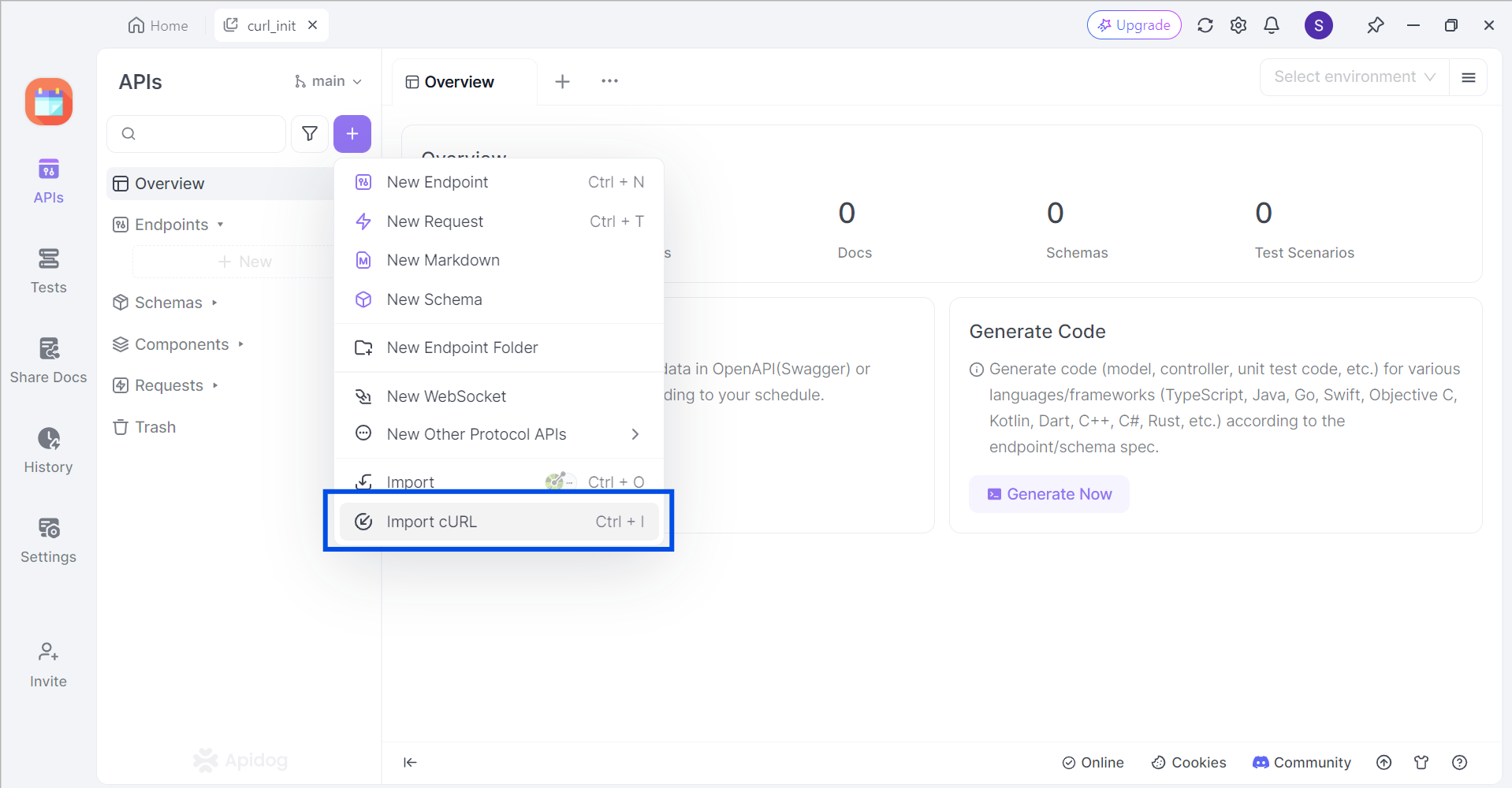
Apidog supports users who wish to import cURL commands to Apidog. In an empty project, click the purple + button around the top left portion of the Apidog window, and select Import cURL.
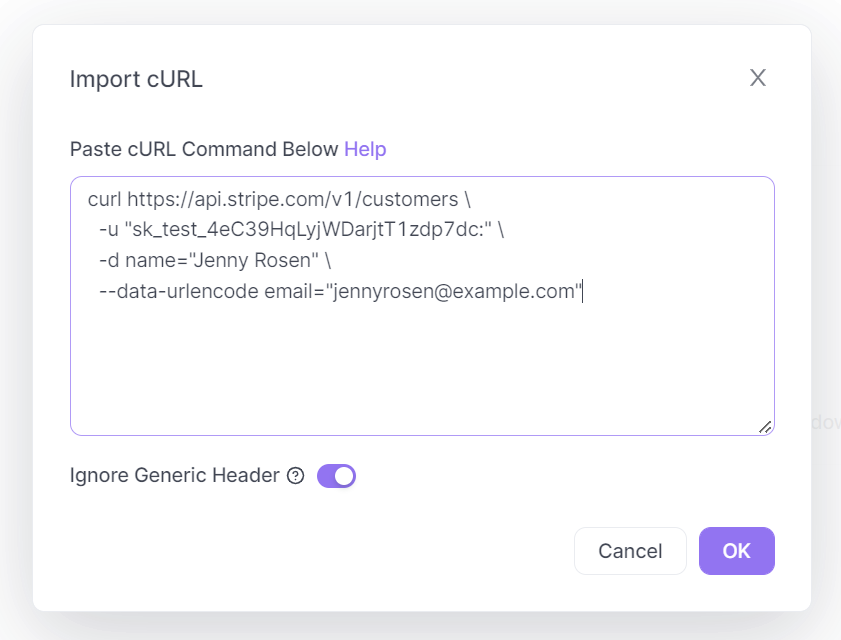
Copy and paste the cURL command into the box displayed on your screen.
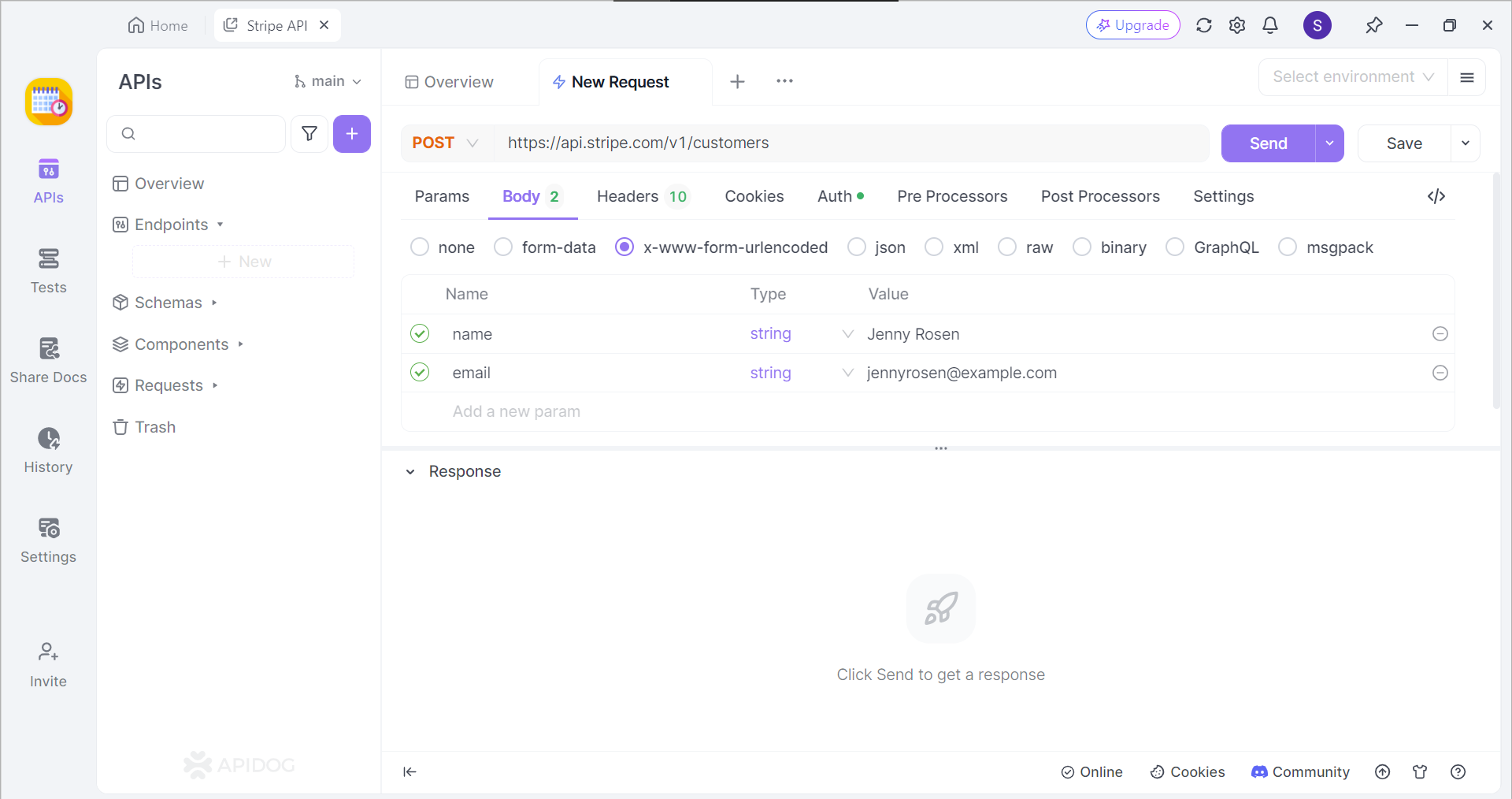
If successful, you should now be able to view the cURL command in the form of an API request.
Generate PHP Code Instantaneously With Apidog
If you do not have prior experience coding in the PHP programming language, fear not! Apidog has a code generation feature that you can rely on, providing you with code frameworks for multiple other programming languages.
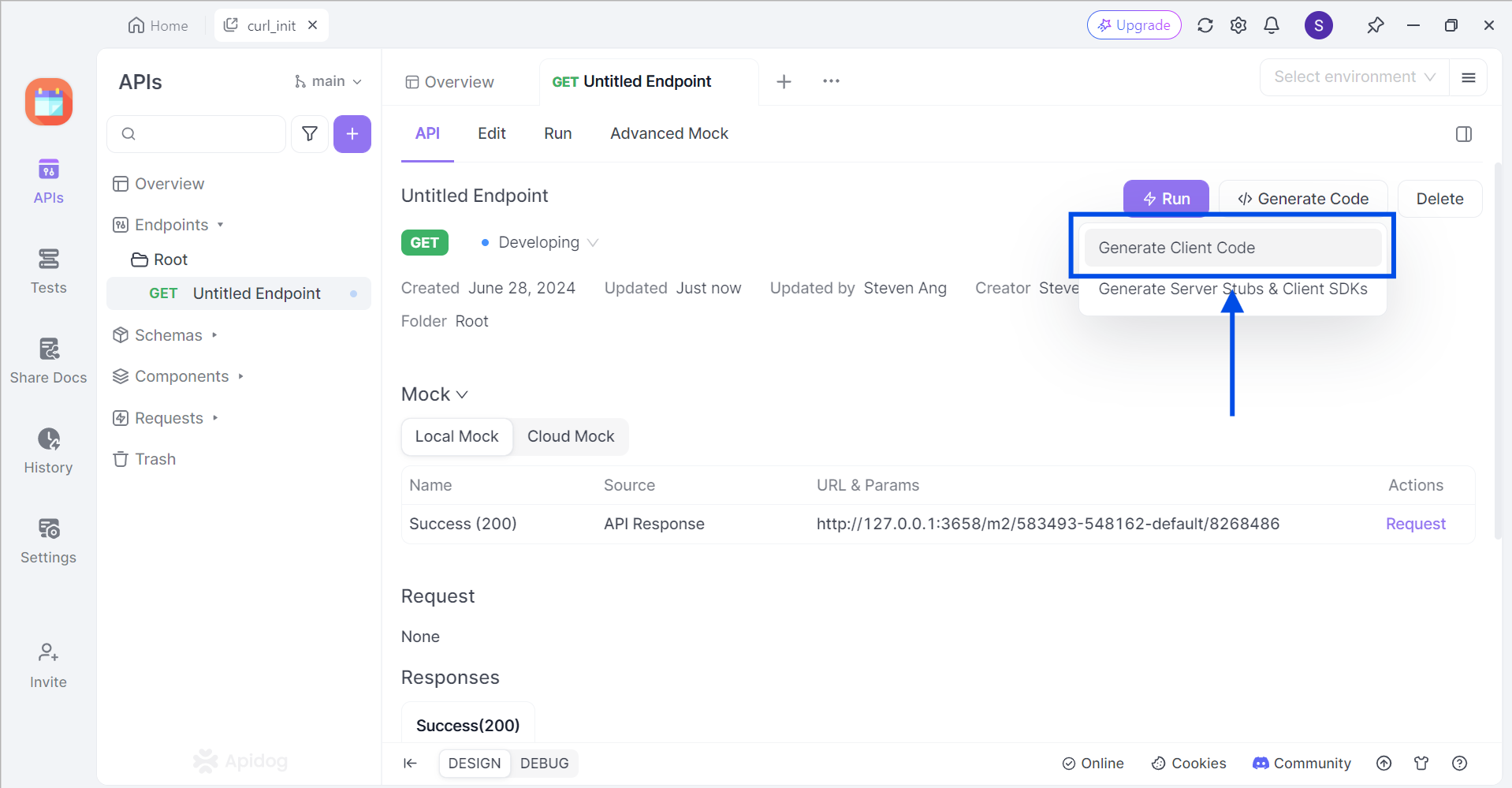
First, locate the </> Generate Code button on any API or request, and select Generate Client Code on the drop-down list.
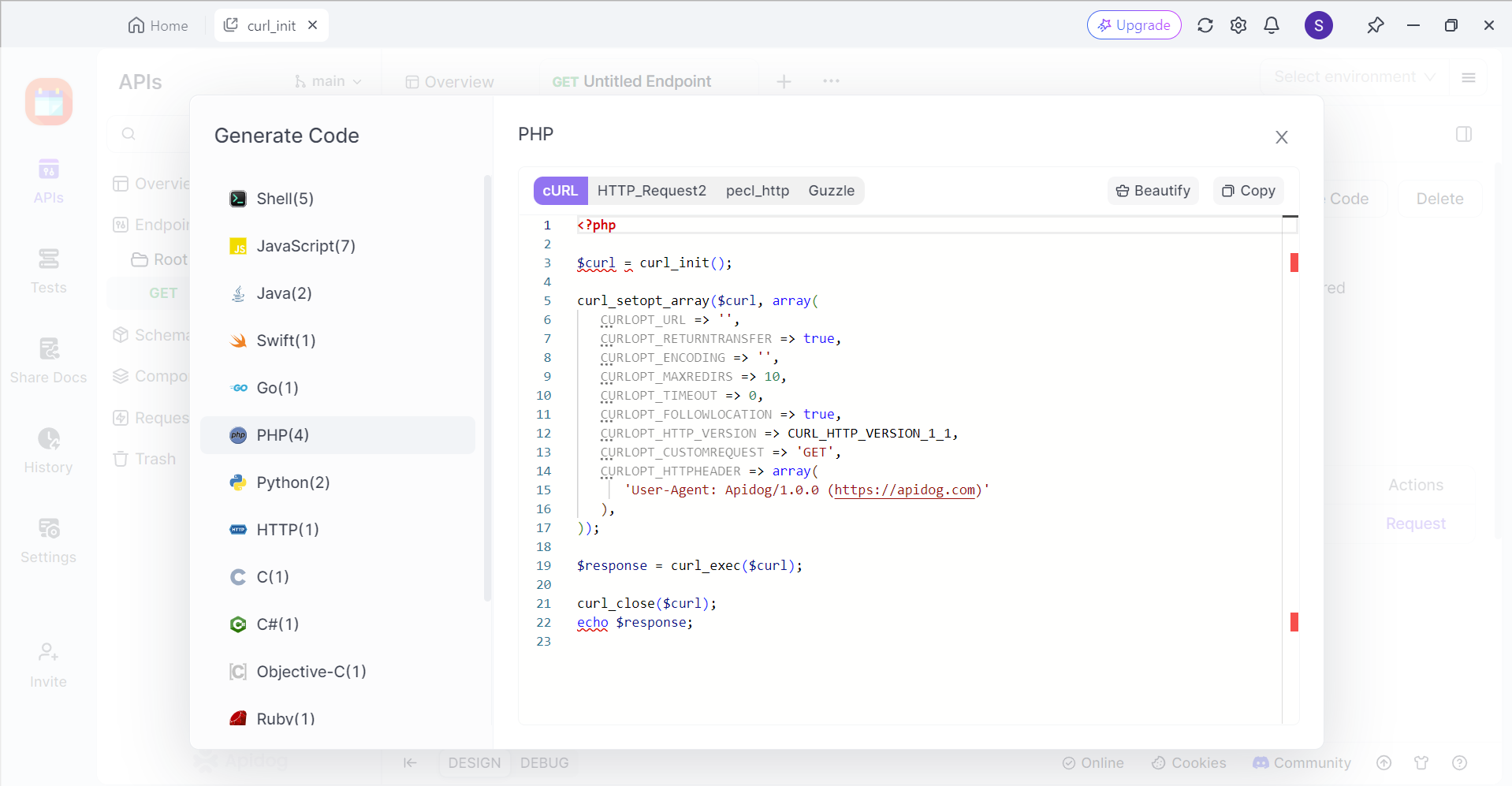
Next, select PHP, and find the cURL section. You should now see the generated code for cURL. All you have to do is copy and paste it to your IDE (Integrated Development Environment) and continue developing your application.
Conclusion
cURL's ability to send OPTIONS requests provides a valuable tool for anyone interacting with servers. Whether you're a developer exploring an API or a system administrator troubleshooting communication issues, understanding what OPTIONS requests reveal empowers you to make informed decisions.
By leveraging this functionality, you can ensure that your applications interact with servers securely and efficiently. Remember, cURL's versatility extends beyond just OPTIONS requests. With its extensive command-line options, cURL allows for fine-grained control over data transfers, making it a powerful asset for various web-related tasks.



